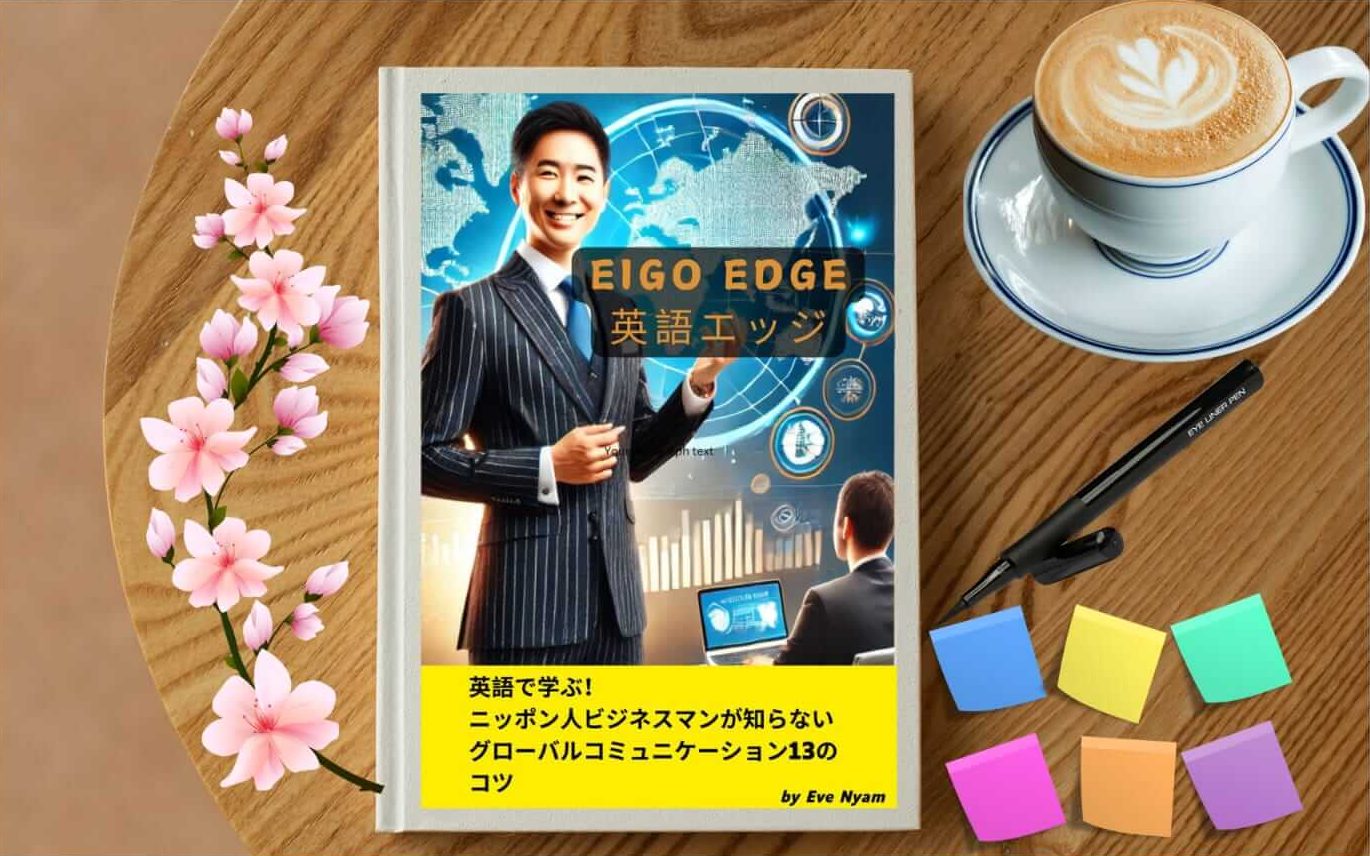Speaking English for Japanese business professionals in global business isn’t just about grammar—it’s about being heard, understood, and respected. If this is you, this post is your roadmap to clarity, confidence, and communication that actually lands.
Have you ever walked out of a meeting wondering if anyone really understood your message?
It is the most frustrating and annoying thing ever! Yet, it can’t be helped in certain circumstances. Being able to hold a basic conversation in a language both sides can understand changes the whole dynamic. More often than not, that language is English!
There is no doubt whatsoever that English has emerged as the lingua franca in the fast-paced, interconnected world of international business. This means that mastering English is no longer an option—it’s a necessity! And that’s for every Japanese business leader aiming to make their mark on the global stage.
But fear not! This article is your ultimate guide to helping you speak English as a Japanese business leader with confidence and charm. After all, who says language learning has to be boring?
Let’s embark on a journey to transform your English communication skills from “so-so” to “CEO-level”—and have some fun along the way.
Why English Matters in Global Business
I remember one time I watched a video that someone had forwarded to me. The title was captivating, the content was clearly something I’m passionate about and I was all set to watch it and take notes.
Until the guest speaker opened her mouth to speak, I could not understand a single word! Worst thing was, she was speaking in English, or at least her version of it! I was puzzled at how a distinguished person who has so much to teach the world could not be bothered to polish her English skills!

Now imagine you’re at an international conference in New York. The coffee is strong, the air is buzzing, and you’re surrounded by industry heavyweights. Then it happens: the keynote speaker mentions your company. Heads turn. All eyes are on you. You’re expected to speak. Will your English dazzle or leave the room puzzled?
What’s the difference between the guest on the video I was watching and you? A big one, YOU are willing to polish and work on your English skills!
English proficiency isn’t just a skill; it’s a gateway to influence. Here is what it enables Japanese business leaders to do:
- Build Relationships: Networking thrives on clear communication, and nothing cements a connection like a well-placed joke in English. Imagine walking into a room full of international business elites and dropping a clever one-liner that gets everyone laughing.
- Negotiate Deals: Precision in language equals power at the negotiating table. Think of English as your laser pointer. aimed correctly, it’s sharp and persuasive. Aimed poorly, well, you’re just confusing the cat.
- Inspire Teams: Your global workforce doesn’t just need instructions; they need inspiration. A leader who communicates effectively in English is like a lighthouse for international teams – guiding, steady, and impossible to ignore. Speak with clarity and warmth, and you’ll not only transcend language barriers but also earn the admiration of a team ready to conquer the world (or at least hit those quarterly targets).
The Common Challenges for Japanese Business Leaders
Let’s address the elephant in the room: speaking English can feel daunting. But why?
1. Cultural Differences
Of course there is a wide divide in culture between Japanese and the rest of the world. Japan is an isolated island that has learned to be independent for a long time from thousands of years ago. It is no wonder then that the English upfront style can feel confrontational or even rude to a Japanese speaker.
On the flip side however, to a native English speaker, Japanese people sometimes or rather often sound indirect, evasive or unclear.
Translating words helps in some instances but it’s barely enough. Bridging this gap demands understanding the intent behind them. It’s about mastering the art of being clear without losing the grace and politeness inherent in Japanese communication.
Think of it as learning to play jazz after years of performing classical music. The notes are familiar, but the rhythm and improvisation are completely new.
2. Pronunciation Perils
The infamous “l” and “r” sounds in English are a rite of passage for Japanese speakers. Who hasn’t had a chuckle over “rice” versus “lice”? These tiny pronunciation slip-ups can lead to some hilarious misunderstandings.
Imagine you’re at a business dinner and proudly announce, “I really love flied lice!” The room erupts in laughter, and you’re left wondering if you’ve accidentally become the evening’s entertainment. It’s not just food mix-ups like “light” and “right,” or “clap” and “crap,” can turn everyday conversations into unintentional comedy sketches.
Of course, the struggle is real, well, so is the solution!
Pronunciation practice can help you conquer these perils. Start with some focused tongue exercises and try over-enunciating words to isolate those tricky sounds. Tools like voice recording apps or AI-based pronunciation guides can work wonders.
And don’t be afraid to laugh at yourself along the way; humor is an excellent learning tool.
Remember, even native English speakers have their own pronunciation hurdles. Try saying “squirrel” quickly if you’re German, or “sixth” if you’re anyone, really.
Ultimately, these pronunciation quirks are just stepping stones on your journey to mastering English. They might cause a few giggles, but they’ll also make you memorable.
So, embrace the “l” and “r” challenge with determination, and soon you’ll be ordering “rice” with flawless pronunciation and a side of confidence.
3. Fear of Mistakes
One thing that I have learnt from having business associations and partners in Japan, and which is highly appreciated is that perfectionism is a hallmark of Japanese professionalism.
However, striving for flawless English can create fear that holds you back. But the fact is that even native speakers stumble over words!
I have definitely met my fair share of Japanese English speakers who struggle with this. The main challenge being the indecision about which vocabulary to use at a certain point, and a major confusion on tenses. I would also not advocate for a certain overconfidence that some others have too.
It is imperative to build your confidence, while expanding your English skills and deepening your understanding of the language.
“失敗は成功の元”
Now let’s a put an edge to your English Communication Skills as a Japanese Executive
Step 1: Build a Strong Foundation
Now, now, you must understand that before you can dominate the boardroom and lead with confidence, you need to build a rock-solid foundation in English. This is a skill that will undoubtedly empower you to connect, inspire, and succeed on the global stage. Here’s how:
Master the Basics
Start with essential business vocabulary and phrases. Focus on:
- Introductions: “It’s a pleasure to meet you. My name is [Name], and I’m the [Position] at [Company].” “We have been exchanging emails for a while now, it is such a pleasure to put a face to the name”.
- Presentations: “Today, I’d like to discuss our strategy for market expansion.”
- Negotiations: “We’re looking for a mutually beneficial agreement.”
Pronunciation Practice
I sometimes encounter new vocabulary, even now, and I’m a native English speaker more often than you would think! I’m not sure if it’s because the English language keeps evolving or the fact that English is so broad generally in itself. I cannot tell you the number of times I underline a word and practice how to say it.
The thing is, repetition is your best friend. I do this all the time, soon enough, voila! I master the new word, phrase or expression.
Use tongue twisters to sharpen your skills. For instance try: “Red lorry, yellow lorry.” If you can say it five times fast, you’re ready for anything.
Listen Actively
Immerse yourself in English by:
- Watching business news channels.
- Listening to podcasts like The Daily or HBR IdeaCast.
- Paying attention to intonation and cadence.
Step 2: Learn to Think in English
Someone lied to the world that proficiency in English is equal to being smart! Of course this is not so! In fact most of the people I have met that are highly intelligent are not that proficient in English, surprise surprise! Japan has the highest IQ in the world so obviously this is very far from the truth.
Translating from Japanese to English mid-conversation is like trying to type on a keyboard with missing keys—slow and frustrating! Which means that mastering English is as essential as your morning cup of matcha in today’s global markets.
Most of my Japanese business partners struggle getting their points across, and it’s not even just about grammar or vocabulary; it’s about sounding confident and natural even when the conversation gets tricky.
Imagine navigating a meeting without worrying if you just mixed up “rice” and “lice.” By honing your English skills, you’ll not only impress international clients but also avoid those awkward pauses where everyone politely pretends to understand.
Remember, the goal isn’t perfection; it’s connection. So, let’s turn those business chats into something smoother than your favorite green tea latte!
Here’s how to break the habit:
Shadowing Technique
Listen to English speakers and repeat what they say immediately. This trains your brain to process English naturally.
Use Simple Sentences
Don’t overcomplicate things. Start with:
- “I agree.”
- “Let’s discuss this further.”
- “What are your thoughts?”
With time, you’ll graduate to Shakespeare-worthy prose….or close, the thy, thou, and art is still tricky even to me!
Practice Thinking Aloud
Narrate your day in English. For example, while brewing coffee, say: “I’m making coffee. I need energy for my meeting today.”
Step 3: Perfect Your Business English
Know Your Audience
You want to resonate with your audience really well, every time. It is how you can build trust and ensure clarity. Tailor your message to their cultural background, industry, and expectations. Use language they relate to and avoid jargon they might not understand. Adjust your tone and vocabulary based on who you’re speaking to. For example:
- Formal: “We appreciate your consideration of our proposal.”
- Casual: “Thanks for looking into our idea!”
Politeness Pays
Japanese professionals excel in politeness. Translate this strength into English by using phrases like:
- “Would you mind if we…?”
- “Could you clarify that point?”
- “It would be great if we could…”
Acing Presentations
Follow the rule of three: Introduce your topic, elaborate on three key points, and summarize.
Example:
- Introduction: “Today, I’ll discuss our quarterly goals.”
- Key Points: “First, revenue growth. Second, cost management. Third, team morale.”
- Conclusion: “To summarize, our focus is growth, efficiency, and collaboration.”
I have written more about acing presentations in more detail. Click here to see more….
Step 4: Embrace Humor and Personality
More often than not, I like to enjoy my job as much as I can. While it may mean a good cup of coffee every now and then, or some jazz music playing in the background as I work, humor is always the clincher for me. I never forget a day where my colleagues or business partners have made me laugh.
Adding humor and personality to your English communication humanizes you and puts others at ease.
Remember, humor isn’t about being a comedian, most normal people cannot be great comedians actually! It’s about showing warmth and approachability, making business conversations engaging and memorable. Business doesn’t have to be boring.
Appropriate Humor
Stick to lighthearted, universally understood jokes. Avoid anything that might be lost in translation.
- Example: “Negotiating prices is like shopping at a flea market—everyone’s looking for a bargain!”
Storytelling Magic
Engage your audience with relatable anecdotes. For instance:
- “When I first visited New York, I accidentally tipped 50% because I misunderstood the bill. Let’s just say the waiter was very happy!”
Step 5: Continuous Learning
Enroll in Specialized Courses
Explore business English programs specifically designed for Japanese executives to excel in international settings.
Prioritize courses that blend the convenience of online learning with the personalized touch of real-time coaching. These programs should focus on practical scenarios, such as negotiations, presentations, and networking, ensuring you gain skills you can apply immediately.

Choose options that include cultural insights alongside language training to help you navigate global business nuances confidently.
Whether it’s mastering clear communication or refining your professional tone, these tailored programs provide the tools to elevate your English proficiency and empower your success on the global stage.
Feedback is Gold
Seek constructive feedback from peers and mentors. Learning from mistakes is part of the process. 失敗は成功のもと.
Stay Curious
Language evolves. As I mentioned earlier, sometimes even I can’t keep up with the new words and phrases, I also must keep adjusting. So keep learning new expressions and industry jargon. For example, terms like “pivot” and “synergy” may sound cliché, but they’re often used in business contexts.
Speaking English in Interviews
Speaking English for Japanese professionals is often challenging especially when going through job interviews —where every word counts, and confidence is key.
Even with solid experience, it’s easy to feel unsure when trying to express your strengths in a second language. That’s why preparing specifically for English interviews is so important. From common questions to cultural tips, we’ve got you covered.
Be sure to check out our guide: How to Ace Your English Job Interview: Essential Tips for Japanese Professionals!. It’s packed with clear, actionable advice to help you communicate with confidence and make the impression you deserve.
Conclusion
As the Japanese saying goes, 七転び八起き —”Fall seven times, stand up eight.” Mistakes are part of the journey, not the end of it.
Even the most polished speakers started as beginners. With persistence, a touch of humor, and the courage to step out of your comfort zone, you’ll soon find yourself speaking English naturally and confidently.
So, what are you waiting for? Ready to take your communication skills to the next level?
Whether you’re presenting in meetings or preparing for your next big career move, mastering speaking English Japanese professionals need is key to standing out. Don’t let language barriers hold you back. With the right training and strategies, you can speak clearly, confidently, and professionally. Start building the skills global business leaders expect.
Subscribe to our newsletter at the bottom of this page for expert tips—and check out our book Eigo Edge for a deeper dive into practical, real-world English. Your success in international business starts with confident communication. Let’s get you there.
Arigato Gozaimasu!


